转自http://www.cnblogs.com/silentNight/p/5466418.html
在linux用gdb或者cgdb计较不爽的地方是无法打印STL的东西,所有啊去网上找了找解决方案https://www.douban.com/note/182826844/?qq-pf-to=pcqq.c2c
本帖把怎么配置这个东西写出了,万一以后忘了,可以回头找找。
首先是下载gdb文件 https://sourceware.org/gdb/wiki/STLSupport ------》找到网页里面的
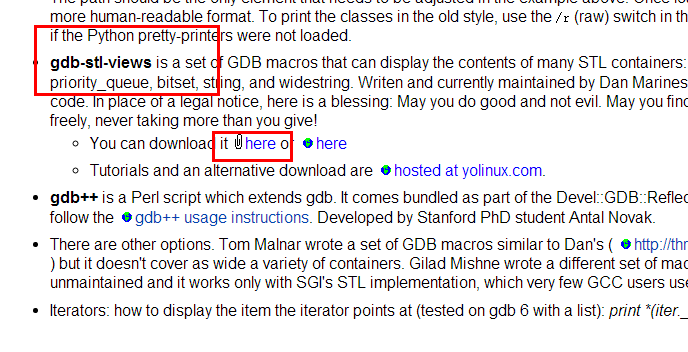 然后点击进去下载stl_views_1.0.3.gdb
然后点击进去下载stl_views_1.0.3.gdb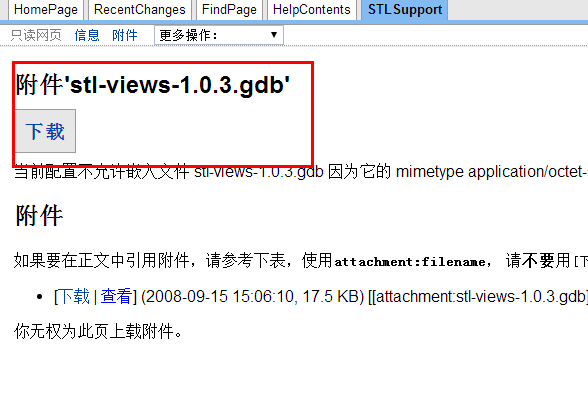
接下来把这个东西当到linux下,位置随便放,我放到了我的用户目录下
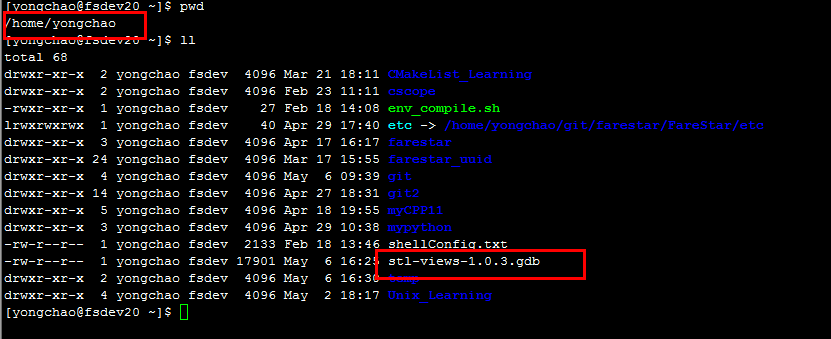
然后写一个小程序测试一下,
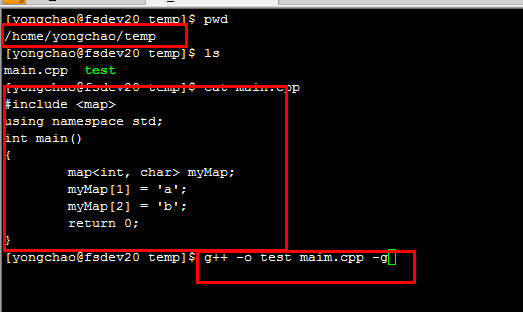
接着cgdb test 进入调试模式,然后加载刚才的stl_views_1.0.3.gdb
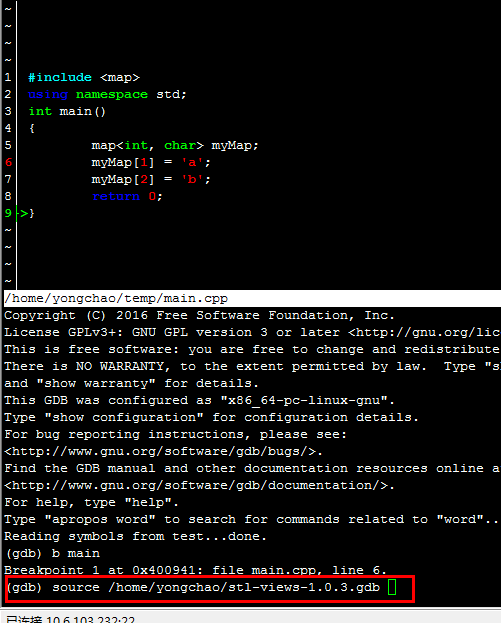
接着就可以看看pmap的命令了

pmap variable------------>打印variable这个map的定义和map里面的个数
pmap variable int int(就是单纯的两个int) ------------>打印pmap的元素和map的个数
pmap variable int int 20------------>打印索引是20的map的值 和map的个数
pmap variable int int 20 200------->打印索引是20 值是200的map值和map的个数
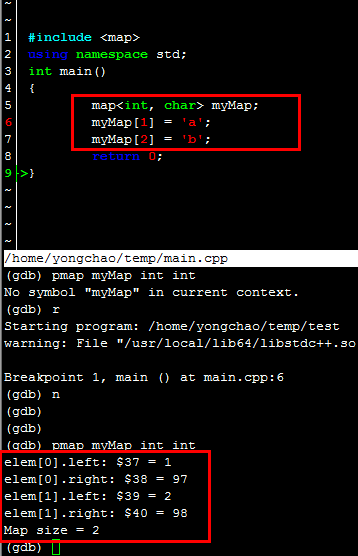
东西很好用,就怕以后链接失效找不到这个文件了,下面会把这个文件东西拷贝在下面。以后用到了,自己建立一个stl_views_1.0.3.gdb,然后把下面的东西拷贝进去使用。
# # STL GDB evaluators/views/utilities - 1.03 # # The new GDB commands: # are entirely non instrumental # do not depend on any "inline"(s) - e.g. size(), [], etc # are extremely tolerant to debugger settings # # This file should be "included" in .gdbinit as following: # source stl-views.gdb or just paste it into your .gdbinit file # # The following STL containers are currently supported: # # std::vector<T> -- via pvector command # std::list<T> -- via plist or plist_member command # std::map<T,T> -- via pmap or pmap_member command # std::multimap<T,T> -- via pmap or pmap_member command # std::set<T> -- via pset command # std::multiset<T> -- via pset command # std::deque<T> -- via pdequeue command # std::stack<T> -- via pstack command # std::queue<T> -- via pqueue command # std::priority_queue<T> -- via ppqueue command # std::bitset<n> -- via pbitset command # std::string -- via pstring command # std::widestring -- via pwstring command # # The end of this file contains (optional) C++ beautifiers # Make sure your debugger supports $argc # # Simple GDB Macros writen by Dan Marinescu (H-PhD) - License GPL # Inspired by intial work of Tom Malnar, # Tony Novac (PhD) / Cornell / Stanford, # Gilad Mishne (PhD) and Many Many Others. # Contact: dan_c_marinescu@yahoo.com (Subject: STL) # # Modified to work with g++ 4.3 by Anders Elton # Also added _member functions, that instead of printing the entire class in map, prints a member. # # std::vector<> # define pvector if $argc == 0 help pvector else set $size = $arg0._M_impl._M_finish - $arg0._M_impl._M_start set $capacity = $arg0._M_impl._M_end_of_storage - $arg0._M_impl._M_start set $size_max = $size - 1 end if $argc == 1 set $i = 0 while $i < $size printf "elem[%u]: ", $i p *($arg0._M_impl._M_start + $i) set $i++ end end if $argc == 2 set $idx = $arg1 if $idx < 0 || $idx > $size_max printf "idx1, idx2 are not in acceptable range: [0..%u].\n", $size_max else printf "elem[%u]: ", $idx p *($arg0._M_impl._M_start + $idx) end end if $argc == 3 set $start_idx = $arg1 set $stop_idx = $arg2 if $start_idx > $stop_idx set $tmp_idx = $start_idx set $start_idx = $stop_idx set $stop_idx = $tmp_idx end if $start_idx < 0 || $stop_idx < 0 || $start_idx > $size_max || $stop_idx > $size_max printf "idx1, idx2 are not in acceptable range: [0..%u].\n", $size_max else set $i = $start_idx while $i <= $stop_idx printf "elem[%u]: ", $i p *($arg0._M_impl._M_start + $i) set $i++ end end end if $argc > 0 printf "Vector size = %u\n", $size printf "Vector capacity = %u\n", $capacity printf "Element " whatis $arg0._M_impl._M_start end end document pvector Prints std::vector<T> information. Syntax: pvector <vector> <idx1> <idx2> Note: idx, idx1 and idx2 must be in acceptable range [0..<vector>.size()-1]. Examples: pvector v - Prints vector content, size, capacity and T typedef pvector v 0 - Prints element[idx] from vector pvector v 1 2 - Prints elements in range [idx1..idx2] from vector end # # std::list<> # define plist if $argc == 0 help plist else set $head = &$arg0._M_impl._M_node set $current = $arg0._M_impl._M_node._M_next set $size = 0 while $current != $head if $argc == 2 printf "elem[%u]: ", $size p *($arg1*)($current + 1) end if $argc == 3 if $size == $arg2 printf "elem[%u]: ", $size p *($arg1*)($current + 1) end end set $current = $current._M_next set $size++ end printf "List size = %u \n", $size if $argc == 1 printf "List " whatis $arg0 printf "Use plist <variable_name> <element_type> to see the elements in the list.\n" end end end document plist Prints std::list<T> information. Syntax: plist <list> <T> <idx>: Prints list size, if T defined all elements or just element at idx Examples: plist l - prints list size and definition plist l int - prints all elements and list size plist l int 2 - prints the third element in the list (if exists) and list size end define plist_member if $argc == 0 help plist_member else set $head = &$arg0._M_impl._M_node set $current = $arg0._M_impl._M_node._M_next set $size = 0 while $current != $head if $argc == 3 printf "elem[%u]: ", $size p (*($arg1*)($current + 1)).$arg2 end if $argc == 4 if $size == $arg3 printf "elem[%u]: ", $size p (*($arg1*)($current + 1)).$arg2 end end set $current = $current._M_next set $size++ end printf "List size = %u \n", $size if $argc == 1 printf "List " whatis $arg0 printf "Use plist_member <variable_name> <element_type> <member> to see the elements in the list.\n" end end end document plist_member Prints std::list<T> information. Syntax: plist <list> <T> <idx>: Prints list size, if T defined all elements or just element at idx Examples: plist_member l int member - prints all elements and list size plist_member l int member 2 - prints the third element in the list (if exists) and list size end # # std::map and std::multimap # define pmap if $argc == 0 help pmap else set $tree = $arg0 set $i = 0 set $node = $tree._M_t._M_impl._M_header._M_left set $end = $tree._M_t._M_impl._M_header set $tree_size = $tree._M_t._M_impl._M_node_count if $argc == 1 printf "Map " whatis $tree printf "Use pmap <variable_name> <left_element_type> <right_element_type> to see the elements in the map.\n" end if $argc == 3 while $i < $tree_size set $value = (void *)($node + 1) printf "elem[%u].left: ", $i p *($arg1*)$value set $value = $value + sizeof($arg1) printf "elem[%u].right: ", $i p *($arg2*)$value if $node._M_right != 0 set $node = $node._M_right while $node._M_left != 0 set $node = $node._M_left end else set $tmp_node = $node._M_parent while $node == $tmp_node._M_right set $node = $tmp_node set $tmp_node = $tmp_node._M_parent end if $node._M_right != $tmp_node set $node = $tmp_node end end set $i++ end end if $argc == 4 set $idx = $arg3 set $ElementsFound = 0 while $i < $tree_size set $value = (void *)($node + 1) if *($arg1*)$value == $idx printf "elem[%u].left: ", $i p *($arg1*)$value set $value = $value + sizeof($arg1) printf "elem[%u].right: ", $i p *($arg2*)$value set $ElementsFound++ end if $node._M_right != 0 set $node = $node._M_right while $node._M_left != 0 set $node = $node._M_left end else set $tmp_node = $node._M_parent while $node == $tmp_node._M_right set $node = $tmp_node set $tmp_node = $tmp_node._M_parent end if $node._M_right != $tmp_node set $node = $tmp_node end end set $i++ end printf "Number of elements found = %u\n", $ElementsFound end if $argc == 5 set $idx1 = $arg3 set $idx2 = $arg4 set $ElementsFound = 0 while $i < $tree_size set $value = (void *)($node + 1) set $valueLeft = *($arg1*)$value set $valueRight = *($arg2*)($value + sizeof($arg1)) if $valueLeft == $idx1 && $valueRight == $idx2 printf "elem[%u].left: ", $i p $valueLeft printf "elem[%u].right: ", $i p $valueRight set $ElementsFound++ end if $node._M_right != 0 set $node = $node._M_right while $node._M_left != 0 set $node = $node._M_left end else set $tmp_node = $node._M_parent while $node == $tmp_node._M_right set $node = $tmp_node set $tmp_node = $tmp_node._M_parent end if $node._M_right != $tmp_node set $node = $tmp_node end end set $i++ end printf "Number of elements found = %u\n", $ElementsFound end printf "Map size = %u\n", $tree_size end end document pmap Prints std::map<TLeft and TRight> or std::multimap<TLeft and TRight> information. Works for std::multimap as well. Syntax: pmap <map> <TtypeLeft> <TypeRight> <valLeft> <valRight>: Prints map size, if T defined all elements or just element(s) with val(s) Examples: pmap m - prints map size and definition pmap m int int - prints all elements and map size pmap m int int 20 - prints the element(s) with left-value = 20 (if any) and map size pmap m int int 20 200 - prints the element(s) with left-value = 20 and right-value = 200 (if any) and map size end define pmap_member if $argc == 0 help pmap_member else set $tree = $arg0 set $i = 0 set $node = $tree._M_t._M_impl._M_header._M_left set $end = $tree._M_t._M_impl._M_header set $tree_size = $tree._M_t._M_impl._M_node_count if $argc == 1 printf "Map " whatis $tree printf "Use pmap <variable_name> <left_element_type> <right_element_type> to see the elements in the map.\n" end if $argc == 5 while $i < $tree_size set $value = (void *)($node + 1) printf "elem[%u].left: ", $i p (*($arg1*)$value).$arg2 set $value = $value + sizeof($arg1) printf "elem[%u].right: ", $i p (*($arg3*)$value).$arg4 if $node._M_right != 0 set $node = $node._M_right while $node._M_left != 0 set $node = $node._M_left end else set $tmp_node = $node._M_parent while $node == $tmp_node._M_right set $node = $tmp_node set $tmp_node = $tmp_node._M_parent end if $node._M_right != $tmp_node set $node = $tmp_node end end set $i++ end end if $argc == 6 set $idx = $arg5 set $ElementsFound = 0 while $i < $tree_size set $value = (void *)($node + 1) if *($arg1*)$value == $idx printf "elem[%u].left: ", $i p (*($arg1*)$value).$arg2 set $value = $value + sizeof($arg1) printf "elem[%u].right: ", $i p (*($arg3*)$value).$arg4 set $ElementsFound++ end if $node._M_right != 0 set $node = $node._M_right while $node._M_left != 0 set $node = $node._M_left end else set $tmp_node = $node._M_parent while $node == $tmp_node._M_right set $node = $tmp_node set $tmp_node = $tmp_node._M_parent end if $node._M_right != $tmp_node set $node = $tmp_node end end set $i++ end printf "Number of elements found = %u\n", $ElementsFound end printf "Map size = %u\n", $tree_size end end document pmap_member Prints std::map<TLeft and TRight> or std::multimap<TLeft and TRight> information. Works for std::multimap as well. Syntax: pmap <map> <TtypeLeft> <TypeRight> <valLeft> <valRight>: Prints map size, if T defined all elements or just element(s) with val(s) Examples: pmap_member m class1 member1 class2 member2 - prints class1.member1 : class2.member2 pmap_member m class1 member1 class2 member2 lvalue - prints class1.member1 : class2.member2 where class1 == lvalue end # # std::set and std::multiset # define pset if $argc == 0 help pset else set $tree = $arg0 set $i = 0 set $node = $tree._M_t._M_impl._M_header._M_left set $end = $tree._M_t._M_impl._M_header set $tree_size = $tree._M_t._M_impl._M_node_count if $argc == 1 printf "Set " whatis $tree printf "Use pset <variable_name> <element_type> to see the elements in the set.\n" end if $argc == 2 while $i < $tree_size set $value = (void *)($node + 1) printf "elem[%u]: ", $i p *($arg1*)$value if $node._M_right != 0 set $node = $node._M_right while $node._M_left != 0 set $node = $node._M_left end else set $tmp_node = $node._M_parent while $node == $tmp_node._M_right set $node = $tmp_node set $tmp_node = $tmp_node._M_parent end if $node._M_right != $tmp_node set $node = $tmp_node end end set $i++ end end if $argc == 3 set $idx = $arg2 set $ElementsFound = 0 while $i < $tree_size set $value = (void *)($node + 1) if *($arg1*)$value == $idx printf "elem[%u]: ", $i p *($arg1*)$value set $ElementsFound++ end if $node._M_right != 0 set $node = $node._M_right while $node._M_left != 0 set $node = $node._M_left end else set $tmp_node = $node._M_parent while $node == $tmp_node._M_right set $node = $tmp_node set $tmp_node = $tmp_node._M_parent end if $node._M_right != $tmp_node set $node = $tmp_node end end set $i++ end printf "Number of elements found = %u\n", $ElementsFound end printf "Set size = %u\n", $tree_size end end document pset Prints std::set<T> or std::multiset<T> information. Works for std::multiset as well. Syntax: pset <set> <T> <val>: Prints set size, if T defined all elements or just element(s) having val Examples: pset s - prints set size and definition pset s int - prints all elements and the size of s pset s int 20 - prints the element(s) with value = 20 (if any) and the size of s end # # std::dequeue # define pdequeue if $argc == 0 help pdequeue else set $size = 0 set $start_cur = $arg0._M_impl._M_start._M_cur set $start_last = $arg0._M_impl._M_start._M_last set $start_stop = $start_last while $start_cur != $start_stop p *$start_cur set $start_cur++ set $size++ end set $finish_first = $arg0._M_impl._M_finish._M_first set $finish_cur = $arg0._M_impl._M_finish._M_cur set $finish_last = $arg0._M_impl._M_finish._M_last if $finish_cur < $finish_last set $finish_stop = $finish_cur else set $finish_stop = $finish_last end while $finish_first != $finish_stop p *$finish_first set $finish_first++ set $size++ end printf "Dequeue size = %u\n", $size end end document pdequeue Prints std::dequeue<T> information. Syntax: pdequeue <dequeue>: Prints dequeue size, if T defined all elements Deque elements are listed "left to right" (left-most stands for front and right-most stands for back) Example: pdequeue d - prints all elements and size of d end # # std::stack # define pstack if $argc == 0 help pstack else set $start_cur = $arg0.c._M_impl._M_start._M_cur set $finish_cur = $arg0.c._M_impl._M_finish._M_cur set $size = $finish_cur - $start_cur set $i = $size - 1 while $i >= 0 p *($start_cur + $i) set $i-- end printf "Stack size = %u\n", $size end end document pstack Prints std::stack<T> information. Syntax: pstack <stack>: Prints all elements and size of the stack Stack elements are listed "top to buttom" (top-most element is the first to come on pop) Example: pstack s - prints all elements and the size of s end # # std::queue # define pqueue if $argc == 0 help pqueue else set $start_cur = $arg0.c._M_impl._M_start._M_cur set $finish_cur = $arg0.c._M_impl._M_finish._M_cur set $size = $finish_cur - $start_cur set $i = 0 while $i < $size p *($start_cur + $i) set $i++ end printf "Queue size = %u\n", $size end end document pqueue Prints std::queue<T> information. Syntax: pqueue <queue>: Prints all elements and the size of the queue Queue elements are listed "top to bottom" (top-most element is the first to come on pop) Example: pqueue q - prints all elements and the size of q end # # std::priority_queue # define ppqueue if $argc == 0 help ppqueue else set $size = $arg0.c._M_impl._M_finish - $arg0.c._M_impl._M_start set $capacity = $arg0.c._M_impl._M_end_of_storage - $arg0.c._M_impl._M_start set $i = $size - 1 while $i >= 0 p *($arg0.c._M_impl._M_start + $i) set $i-- end printf "Priority queue size = %u\n", $size printf "Priority queue capacity = %u\n", $capacity end end document ppqueue Prints std::priority_queue<T> information. Syntax: ppqueue <priority_queue>: Prints all elements, size and capacity of the priority_queue Priority_queue elements are listed "top to buttom" (top-most element is the first to come on pop) Example: ppqueue pq - prints all elements, size and capacity of pq end # # std::bitset # define pbitset if $argc == 0 help pbitset else p /t $arg0._M_w end end document pbitset Prints std::bitset<n> information. Syntax: pbitset <bitset>: Prints all bits in bitset Example: pbitset b - prints all bits in b end # # std::string # define pstring if $argc == 0 help pstring else printf "String \t\t\t= \"%s\"\n", $arg0._M_data() printf "String size/length \t= %u\n", $arg0._M_rep()._M_length printf "String capacity \t= %u\n", $arg0._M_rep()._M_capacity printf "String ref-count \t= %d\n", $arg0._M_rep()._M_refcount end end document pstring Prints std::string information. Syntax: pstring <string> Example: pstring s - Prints content, size/length, capacity and ref-count of string s end # # std::wstring # define pwstring if $argc == 0 help pwstring else call printf("WString \t\t= \"%ls\"\n", $arg0._M_data()) printf "WString size/length \t= %u\n", $arg0._M_rep()._M_length printf "WString capacity \t= %u\n", $arg0._M_rep()._M_capacity printf "WString ref-count \t= %d\n", $arg0._M_rep()._M_refcount end end document pwstring Prints std::wstring information. Syntax: pwstring <wstring> Example: pwstring s - Prints content, size/length, capacity and ref-count of wstring s end # # C++ related beautifiers (optional) # set print pretty on set print object on set print static-members on set print vtbl on set print demangle on set demangle-style gnu-v3 set print sevenbit-strings off
























 1174
1174











 被折叠的 条评论
为什么被折叠?
被折叠的 条评论
为什么被折叠?








